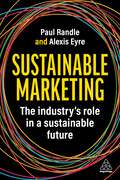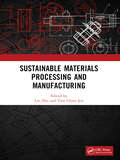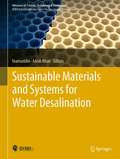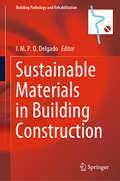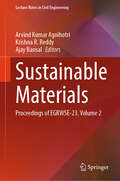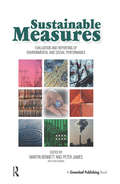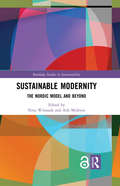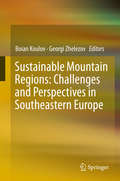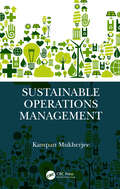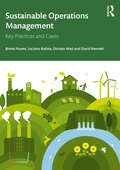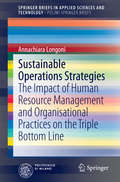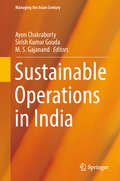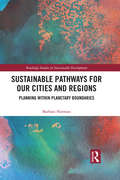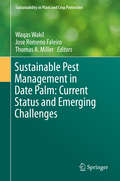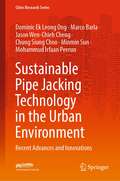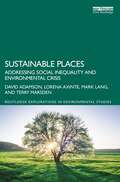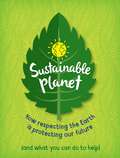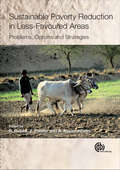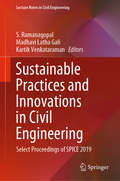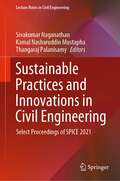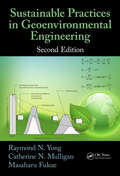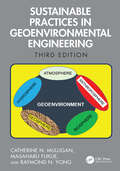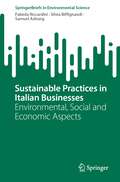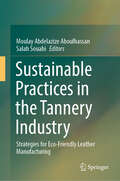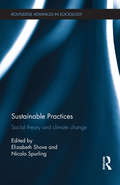- Table View
- List View
Sustainable Marketing: The Industry’s Role in a Sustainable Future
by Paul Randle Alexis EyreBecoming a sustainable marketer is no longer an optional extra. Sustainability has become a necessity for the future, but do you feel confident delivering on this for your clients and customers?Sustainable Marketing is a blueprint for embedding sustainability at the heart of marketing. Exposing the disturbing reality of marketing's current relationship with many of our environmental and societal problems, it challenges the traditional role of marketing, its cultural norms and gross inefficiency. It goes on to present a compelling vision for change and a practical guide for marketing professionals, equipping them with the mindset and tools to transform their daily work and the industry as a whole, into a force for good.This is the perfect guide for marketing and sustainability professionals working through their company's sustainable transformation whilst trying to avoid the pitfalls of greenwashing and carbon myopia. Written by experts who apply their unique framework to the issue, this book takes what may feel like an insurmountable challenge and breaks it down, giving in-depth advice and providing real-world success stories from companies of all sizes including Tony's Chocolonely, The Onlii and AkzoNobel.
Sustainable Materials Processing and Manufacturing: Proceedings of the 3rd International Conference on Sustainable Materials Processing and Manufacturing
by Tien-Chien Jen Lin ZhuThe conference on ‘Substantial Materials Processing and Manufacturing (SMPM)’ aims to bring together scientists, researchers, and companies to attend and share their vision, ideas, recent developments as well as advanced scientific and technical knowledge in the field of materials processing and manufacturing. The conference is concerned with sustainable engineering, life cycle engineering, sustainable manufacturing systems and technologies, sustainable materials and processing, sustainable product design and development, sustainable supply chain and business models, renewable energy and sustainable development, Industry 4.0 and Internet of Things, modelling and simulation of sustainable manufacturing, intelligent agricultural equipment, etc. The conference has invited some academicians and research leaders in related fields to give the keynote report. Based on the theme of this book, eighteen outstanding and high-quality manuscripts have been selected for the publication in this book. The detailed information is presented below.
Sustainable Materials and Systems for Water Desalination (Advances in Science, Technology & Innovation)
by Inamuddin Anish KhanThis edited book explores the most promising and reliable technological developments expected to impact on the next generation of desalination systems. The book includes research studies which takes the reader on a fascinating walk through the multidisciplinary world of membrane science applied to water treatment. Concerning the ultimate technological advancement, the book seeks to investigate how to bridge the gap between the laboratory scale and the applicability to industry.
Sustainable Materials in Building Construction (Building Pathology and Rehabilitation #11)
by J. M. P. Q. DelgadoThis book presents a selection of recent research works that provide best practice solutions, case studies and practical advice on the implementation of sustainable construction techniques. The topics covered include innovations in building sustainability assessment, sustainable construction and materials, service-life prediction, construction 4.0, digitalization of the construction process, and circular economy. Reviewing the current state of knowledge, the book will benefit scientists, students, practitioners, lecturers and other interested parties in a range of scientific and engineering disciplines, e.g. civil, materials and mechanical engineering.
Sustainable Materials: Proceedings of EGRWSE-23, Volume 2 (Lecture Notes in Civil Engineering #509)
by Krishna R. Reddy Arvind Kumar Agnihotri Ajay BansalThis book contains peer-reviewed and selected papers presented during the International Conference on Environmental Geotechnology, Recycled Waste Materials and Sustainable Engineering (EGRWSE) 2023, held at NIT Jalandhar. It discusses the recent innovations, trends, concerns, practical challenges encountered, and the solutions adopted in waste management and engineering, geotechnical and geoenvironmental engineering, infrastructure engineering and sustainable engineering. This book can serve as a useful resource for researchers, educators, policymakers, and professionals working in the field of civil engineering, chemical engineering, environmental sciences, and public policy.
Sustainable Measures: Evaluation and Reporting of Environmental and Social Performance
by Peter James Martin Bennett Leon KlinkersEnvironmental and social performance measurement and reporting by business has become a high-profile issue during the 1990s. It is increasingly being requested by stakeholders and required by governments. Companies too are finding that they need better environmental and social performance data for effective internal management. And there are a growing number of standardisation initiatives – such as the ISO 14031 guidelines on environmental performance evaluation or the CERES Global Reporting Initiative (GRI) template for sustainability reporting – that are aimed at making it easier for more companies to take action, and for stakeholders to compare their progress.Sustainable Measures collects together most of the key work and individuals concerned with the topic from around the world. Contributions include: environmental and social reporting by John Elkington and colleagues at SustainAbility; the GRI discussion draft; Roger Adams and Martin Houldin on the FEE study of environmental reporting; Janet Ranganathan of the World Resources Institute on sustainability measures; and Martin Bennett and Peter James on ISO 14031 and the future of environmental performance evaluation. There are also chapters examining current practice in Austria, Denmark, India, Indonesia, Japan, the Netherlands and South Africa, developments in electronic reporting, as well as case studies of Baxter, Kunert, Niagara Mohawk, Unox, The Body Shop and the UK water industry, and an analysis of leading social reports.The book is essential reading for all academics, campaigners, policy-makers and practitioners with an interest in issues such as:The standardization and comparability of environmental and social performance measuresMeasuring and reporting on sustainable businessEco-points and other means of evaluating product impactsThe implementation of measurement and reportingBest practice in corporate environmental and social reportingNew means of communicating environmental dataEnvironmental performance evaluation in developing countries
Sustainable Modernity: The Nordic Model and Beyond (Routledge Studies in Sustainability)
by Nina Witoszek Atle MidttunThe Open Access version of this book, available at https://www.taylorfrancis.com/books/e/9781351765633, has been made available under a Creative Commons Attribution-Non Commercial-No Derivatives 4.0 license. In the 21st century, Norway, Denmark and Sweden remain the icons of fair societies, with high economic productivity and quality of life. But they are also an enigma in a cultural-evolutionary sense: though by no means following the same socio-economic formula, they are all cases of a "non-hubristic", socially sustainable modernity that puzzles outside observers. Using Nordic welfare states as its laboratory, Sustainable Modernity combines evolutionary and socio-cultural perspectives to illuminate the mainsprings of what the authors call the "well-being society". The main contention is that the Nordic uniqueness is not merely the outcome of one particular set of historical institutional or political arrangements, or sheer historical luck; rather, the high welfare creation inherent in the Nordic model has been predicated on a long and durable tradition of social cooperation, which has interacted with global competitive forces. Hence the socially sustainable Nordic modernity should be approached as an integrated and tightly orchestrated ecosystem based on a complex interplay of cooperative and competitive strategies within and across several domains: normative-cultural, socio-political and redistributive. The key question is: Can the Nordic countries uphold the balance of competition and cooperation and reproduce their resilience in the age of globalization, cultural collisions, the digital economy, the fragmentation of the work/life division, and often intrusive EU regulation? With contributors providing insights from the humanities, the social sciences and evolutionary science, this book will be of great interest to students and scholars of political science, sociology, history, institutional economics, Nordic studies and human evolution studies.
Sustainable Mountain Regions: Challenges and Perspectives in Southeastern Europe
by Boian Koulov Georgi ZhelezovCentral to this edited volume is the proposition that the mountainous border region of Southeastern Europe needs to become a special target of European Union scale, regional development policy-making. Vivid case studies from eleven Central and Southeast European states present diverse perspectives on this region's physical geography, economy and demographics and demonstrate the integrative potential of the geographic perspective in mountain research. Europe as a whole has a lot to gain from a "sustainable mountains" policy, especially in Southeast Europe. In their focus on the sustainable development of such areas, the chapters consider regional development policy, ecosystem services assessment, small-scale tourism, and forestry management. This book will be of interest to a wide audience, including academics, students, and practitioners in the fields of geography, ecology, and environmental studies.
Sustainable Operations Management
by Kampan MukherjeeThis book includes concepts, methodologies, and practices for achieving sustainability in business operations. The underlying concept is explained from two perspectives—organizational level and policy level. In the former, all principles, techniques, and decision-making issues relevant to sustainability at unit level, management of product recovery processes, and sustainability at integrated level are captured. Content on policy-level perspective includes policies, norms, guidelines, and regulatory measures both at global and national levels. The primary goal of this book is the creation of an integrated and value-rich platform for the initiation and management of sustainable operations. Features: This book offers a comprehensive overview of environmental sustainability from the operations and supply chain perspective. This book proposes an understandable and innovative viewpoint in explaining sustainable operations management comprehensively as managing operations sustainably at organizational level. Readers will learn the concepts, techniques, and the core factors relating to managing operations, keeping in view various dimensions of sustainability and the macro-level guidelines, norms, regulatory measures, and the like in this context. This book adds to the knowledge on design, planning, and management of sustainable operations, including the specific management approaches. This book includes summary and review questions at the end of each chapter. This book is aimed at graduate students and researchers in industrial, production, and mechanical engineering, including operations management. It is also recommended as a textbook for courses such as sustainable development, sustainable operations management, and environmental management.
Sustainable Operations Management: Key Practices and Cases
by David Bennett Breno Nunes Luciano Batista Donato MasiSustainable Operations Management applies the issues of sustainability to all strategic decisions of operations: capacity management, supply network, process technology, and development and organisation. This book extends the existing literature of operations management that for years has been paramount in creating economic value with little consideration of environment and social dimensions. Whilst based on robust theoretical frameworks, some developed by its own authors, the book is enriched by international case studies and real-world illustrations throughout, to demonstrate how this theory translates to practice. Each chapter begins with learning objectives and ends with a summary, activity, and questions for discussion. Readers will gain a comprehensive and in-depth knowledge on how to manage operations for sustainability. They will learn the ways to formulate a sustainable operations strategy and the elements involved in managing tactical and operational activities to enhance sustainability performance over time. The book covers all aspects of the new business sustainability paradigm from an operations perspective, including sustainable development goals, the circular economy and digital transformation. With international agreements and national policies in place around themes such as climate change, ocean plastic pollution, loss of biodiversity, water scarcity, and zero landfill targets, this book will be a must for any university abiding to the Principles of Responsible Management Education (PRIME). The text is suitable mostly for MSc and MBA students on sustainable supply chain and operations management modules as well as broader Operations Management courses, but it can also be used for final-year Undergraduate students as part of advanced operations management modules. Online resources include chapter-by-chapter PowerPoint slides and a test bank of questions.
Sustainable Operations Strategies
by Annachiara LongoniThis book provides detailed guidance on how sustainability, in terms of the triple bottom line, can be developed in operations strategies via human resource management (HRM) and organizational practices such as teamwork, training and employee involvement. The impacts of HRM and organizational practices on environmental and social sustainability, trade-off optimization and the triple bottom line are carefully analyzed, with attention to aspects including organizational responsibility and worker commitment to sustainability. Valuable tips are offered on formulation and implementation of sustainable operations strategies and in addition the alignment of lean manufacturing and the triple bottom line is addressed in a dedicated section. The background to the book and the reason for its topicality, is the difficulty that companies are experiencing in defining and implementing effective sustainability programs that enhance environmental, social and economic sustainability and optimize possible trade-offs. Moreover, although the operations management literature has focused mainly on technical aspects, HRM and organizational practices may also be relevant in enhancing programs' effectiveness and directly impacting sustainability.
Sustainable Operations in India (Managing The Asian Century Ser.)
by Ayon Chakraborty Sirish Kumar Gouda M. S. GajanandThis book focuses on understanding the status quo of sustainable practices in industry operations from an emerging economy perspective, presenting various practices in India. In order to offer a balance between theory and practice, it provides guidelines for applying models to achieve the goal of sustainability in this competitive environment. The chapters include theoretical perspectives, models and empirical evidence on sustainable practices from Indian industries. The book also presents a scholarly perspective on sustainable operations from various researchers and practitioners in India for a global audience in academia and industry.
Sustainable Pathways for our Cities and Regions: Planning within Planetary Boundaries (Routledge Studies in Sustainable Development)
by Barbara NormanIn an urbanizing world, the majority of people live in urban settlements predominantly on the coastal edge. Focus has historically been on people, place and the challenges and opportunities of living with global change, and academic attention has largely been on sustainability science or sustainable solutions. This book seeks to strengthen the relatively weak link between sustainability science, land use planning and socio-economic change, and show that a more integrated approach to planning will be required to develop more sustainable pathways for cities and regions in the future. Sustainable Pathways for our Cities and Regions builds on the recent publications on cities and climate change, resilient cities and coasts, and sustainable cities, and looks at the ways in which current planning approaches need to be adapted to embrace concepts including green growth, planetary boundaries, healthy cities and longer-term sustainability. Drawing on case studies from four cities selected for their publicly stated commitment to sustainability – Canberra, Kuala Lumpur, Copenhagen and New York – the author proposes seven sustainable pathways and draws conclusions on the positive contribution planning can make in preparing urban and regional communities for significant change in the twenty-first century city. This book will be of great interest to students and scholars of urban planning, sustainable cities, climate change, green growth and community engagement. It will also be of great value to leaders and community activists seeking more sustainable pathways for their cities and regions.
Sustainable Pest Management in Date Palm: Current Status and Emerging Challenges
by Jose Romeno Faleiro Waqas Wakil Thomas A. MillerDate palm, Phoenix dactylifera L. (Arecales: Arecaceae), is an important palm species cultivated in the arid regions of the world since pre-historic times and traditionally associated with the life and culture of the people in the Middle-East and North Africa which are the pre-dominant date palm growing regions worldwide. The Food and Agriculture Organization of the UN estimates that there are over 100 million date palms with an annual production of over 7. 5 million tonnes A recent report on the arthropod fauna of date palm, enlists 112 species of insects and mites associated with date palm worldwide including 22 species attacking stored dates. Enhanced monoculture of date palm in several date palm growing countries coupled with climate change, unrestrained use of chemical insecticides and extensive international trade is likely to impact the pest complex and the related natural enemies in the date agro-ecosystems. In view of the importance of date palm as an emerging crop of the future and the need to develop and deploy ecologically sound and socially acceptable IPM techniques, this book aims to comprehensively address issues related to the biology and sustainable management of major insect and mite pests of date palm by assessing the current IPM strategies available, besides addressing emerging challenges and future research priorities. The issues pertaining to the role of semiochemicals in date palm IPM involving new strategies revolving around "attract and kill" and "push-pull" technologies, phytoplasmas and their insect vectors with implications for date palm, innovative methods for managing storage pests of dates and knowledge gaps in devicing sustainable strategies for the management of red palm weevil, Rhynchophorus ferrugineus (Olivier) are also addressed
Sustainable Pipe Jacking Technology in the Urban Environment: Recent Advances and Innovations (Cities Research Series)
by Marco Barla Dominic Ek Ong Jason Wen-Chieh Cheng Chung Siung Choo Minmin Sun Mohammud Irfaan PeerunThis book highlights recent advancements and innovations in trenchless technology via the adoption of combined micro-tunnelling and pipe-jacking techniques. This technique is more environmentally friendly, cost effective, less time-consuming and less disruptive compared to conventional open trench excavations for urban construction and urban infrastructure renewal projects. Pipe jacking is a non-destructive technique used in the installation of underground pipelines using a tunnel boring machine (TBM) and thrust forces derived from the hydraulic jack set-up in a deep jacking shaft. It is popular and commonly used worldwide for the installation of sewer and common services cable tunnels as well as for oil and gas pipelines.
Sustainable Places: Addressing Social Inequality and Environmental Crisis (Routledge Explorations in Environmental Studies)
by Terry Marsden David Adamson Lorena Axinte Mark LangThis book calls for more holistic place-based action to address the social and environmental crisis, deploying the Deep Place approach as one contribution to the toolbox of actions that will underpin the UN Decade of Action towards the Sustainable Development Goals. The authors suggest that ‘place’ is a critical window on how to conceive a resolution to the multiple and overlapping crises. As well as diagnosing the problem (the world as it is), this book also offers a normative advocacy (the world as it could/should be and proposed pathways to get there). A series of ‘Deep Place’ case studies from the UK, Australia, and Vanuatu help to illustrate this approach. Ultimately, the book argues for the need for a real and green ‘new deal’ and identifies what this should be like. It suggests that a new economic order, whilst eventually inevitable, requires radical change. This will not be easy but will be essential given the current impasse, caused, not least by the conjunction of carbon-based, neoliberal capitalism in crisis and the multifactorial global ecological crisis. Ultimately, it concludes that there is a need to develop a new model of ‘regenerative collectivism’ to overcome these crises. This book will be of interest to academics, policy practitioners, and social and climate justice advocates/activists.
Sustainable Planet
by Anna ClaybourneSustainable Planet gives young readers a clear, insightful introduction to Earth's sustainability crisisSustainability is defined as 'development that meets the needs of the present without compromising the ability of future generations to meet their own needs'. In the simplest terms, sustainability is about children and the world we will leave them.Earth is uniquely able to sustain life. Yet we are stripping it of its natural resources, polluting its land and waters and heating its atmosphere, with terrifying consequences. A more sustainable world is urgently needed - now.Sustainable Planet takes a non-alarmist, but truthful, look at the issue of sustainability and suggests ways we can all live in a more planet-friendly way, from global changes such as investing in renewable energy sources and carbon offsetting, to individual actions such as eating less meat and fish and avoiding plastic packaging that will empower young readers.Following on from the successful Plastic Planet, Hot Planet and Recycled Planet, Sustainable Planet is written by the award-winning science author Anna Claybourne.
Sustainable Poverty Reduction in Less-favoured Areas
by J. Pender R. Ruben A. KuyvenhavenTypically defined in terms of fragile agricultural resource base and/or limited access, but also occasionally characterized in terms of population dynamics, so-called less-favored areas pose a number of human development and poverty reduction challenges while remaining the home of an estimated 42% of the population of the developing world.
Sustainable Practices and Innovations in Civil Engineering: Select Proceedings of SPICE 2019 (Lecture Notes in Civil Engineering #79)
by Madhavi Latha Gali S. Ramanagopal Kartik VenkataramanThis book presents the select proceedings of the International Conference on Sustainable Practices and Innovations in Civil Engineering (SPICE 2019). The chapters discuss emerging and current research in sustainability in different areas of civil engineering, which aim to provide solutions to sustainable development. The contents are broadly divided into the following six categories: (i) structural systems, (ii) environment and water resource systems, (iii) construction technologies, (iv)geotechnical systems, (v) innovative building materials, and (vi) transportation. This book will be of potential interest for students, researchers, and practitioners working in sustainable civil engineering related fields.
Sustainable Practices and Innovations in Civil Engineering: Select Proceedings of SPICE 2021 (Lecture Notes in Civil Engineering #179)
by Sivakumar Naganathan Kamal Nasharuddin Mustapha Thangaraj PalanisamyThis book presents the select proceedings of the international conference on Sustainable Practices and Innovations in Civil Engineering 2021 (SPICE 2021). The topics covered include the addition and replacement of cementitious materials in concrete, thereby enhancing the strength and durability characteristics of concrete, instrumentation and testing in structural engineering, ground improvement techniques, water management, waste management, and energy efficiency and sustainability in construction. It also includes few papers in the area of environmental civil engineering and discusses key issues in the field of water resources and the impact of COVID-19 on the construction industry. This book is a valuable reference to the students, researchers, and professionals in the field of civil engineering.
Sustainable Practices in Geoenvironmental Engineering
by Raymond N. Yong Catherine N. Mulligan Masaharu FukueIn the seven years since the publication of the first edition of Sustainable Practices in Geoenvironmental Engineering, the combination of population growth and increased exploitation of renewable and non-renewable natural resources has added increased stresses on the quality and health of the geoenvironment. This is especially true when viewed in
Sustainable Practices in Geoenvironmental Engineering
by Raymond N. Yong Catherine N. Mulligan Masaharu FukueThis third edition focuses on the application of geoenvironmental engineering procedures and practices to mitigate and reduce the adverse impacts on the geoenvironment from anthropogenic sources including emerging contaminants such as micro and nanoplastics, pharmaceuticals, and fire retarding chemicals. Thoroughly updated with three new chapters and extensive use of case studies to showcase examples of sustainable practices, this new edition discusses many activities that are still generating geoenvironmental impacts that are adverse to the quality and health of the geoenvironment. It includes new tools and procedures that have been developed to evaluate and minimize adverse impacts. This new edition: Discusses the impacts of climate change and potential mitigation. Addresses emerging contaminants of concern. Introduces an entirely new chapter on sustainable nitrogen and carbon cycles. Includes new case studies like the Fukushima case study on sediments and microbial induced precipitation processes. Provides new practices and tools for sustainability to evaluate and to minimize adverse impacts Discusses the aspects of social sustainability and cultural aspects of the geoenvironment. This book is intended for professionals, researchers, academics, senior undergraduate students, and graduate students in geotechnical engineering, geoenvironmental engineering, site remediation, sustainable development, and earth sciences.
Sustainable Practices in Italian Businesses: Environmental, Social and Economic Aspects (SpringerBriefs in Environmental Science)
by Silvia Biffignandi Fabiola Riccardini Samuel AshongThis SpringerBrief describes the development and use of a synthetic indicator to assess different degrees of sustainability adoption by economic sector and businesses size. To make this analysis a theoretical framework which involves variables common to alternative frameworks (specifically ESG, GRI and Istat) is proposed. The empirical analysis focuses on the environmental, social and economic variables of the Italian businesses. In this analysis, all three pillars of sustainability – economic, environmental, and social – are considered. The work begins with a review of business sustainability literature and a look into institutional frameworks for the development and measurement of the phenomena. Connections between businesses and the SDGs are examined and comparison of the classifications of sustainable activities defined by GRI and ESG international standards is used to define a framework to be adopted to analyse ISTAT Business Census. Selected indicator variables are aggregated with a synthetic indicator and the results are presented (this is a new proposal of a synthetic indicator useful for the type of data used and published by ISTAT – Italian National Statistical Institute), discussing pros and cons of using it. This study provides two important innovative contributions. The first one is about how to approach the theoretical framework of businesses sustainability at firms aggregated level. The basic idea to work on a set of variables common to different approaches is interesting from the interpretative point of view. The second one, is about the specific empirical analysis, i.e. the Italian businesses sustainability situation. The investigation based on this new theoretical classification/framework and the new proposed indicator provides some interesting substantive results.
Sustainable Practices in the Tannery Industry: Strategies for Eco-Friendly Leather Manufacturing
by Salah Souabi Moulay Abdelazize AboulhassanTannery operations have significant environmental impacts due to liquid, solid, and gaseous waste discharges, along with substantial consumption of resources like raw hides, energy, chemicals, and water. On average, tanneries use 50 m3 of water and 300 kg of chemicals per ton of processed hides, exacerbating global drought challenges. To mitigate these impacts, there's a critical need to rethink water management practices in the industry. This book offers an approach to decouple economic growth from resource overuse, thereby combating climate change. It guides businesses in managing the production process with a focus on recycling water and product components, such as chromium, which is highly toxic. Integrated management methods, including the application of consumption ratios and adherence to standards like ISO management systems, are highlighted. Given the complexity and cost of treatment technologies, prioritizing best practices and preventive measures is essential to reduce liquid and solid waste production. The book also underscores the advantages of clean technologies in curbing water and chemical usage. In summary, this resource empowers tanneries to operate more efficiently and sustainably, fostering responsible economic development.
Sustainable Practices: Social Theory and Climate Change (Routledge Advances in Sociology)
by Elizabeth Shove Nicola SpurlingClimate change is widely agreed to be one the greatest challenges facing society today. Mitigating and adapting to it is certain to require new ways of living. Thus far efforts to promote less resource-intensive habits and routines have centred on typically limited understandings of individual agency, choice and change. This book shows how much more the social sciences have to offer. The contributors to Sustainable Practices: Social Theory and Climate Change come from different disciplines – sociology, geography, economics and philosophy – but are alike in taking social theories of practice as a common point of reference. This volume explores questions which arise from this distinctive and fresh approach: how do practices and material elements circulate and intersect? how do complex infrastructures and systems form and break apart? how does the reproduction of social practice sustain related patterns of inequality and injustice? This collection shows how social theories of practice can help us understand what societal transitions towards sustainability might involve, and how they might be achieved. It will be of interest to students and researchers in sociology, environmental studies, geography, philosophy and economics, and to policy makers and advisors working in this field.
